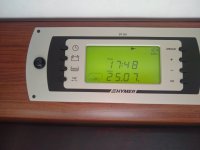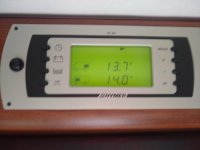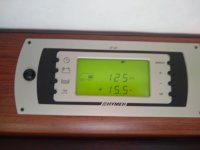I don't understand your question. Or rather why you are asking this question.
As the charge in a
battery gets used, the voltage lowers. then when the
battery is recharged, the
battery increases again. You have had this motorhome for 6 years you said? You must have seen this behaviour before?
when you say "capacity" you mean MAXIMUM POSSIBLE CAPACITY, then no, as you lose possible capacity, the voltage does not stop rising to the same top voltage. the fact you may still have a
battery that is at rest 12.7V now, and 6 years ago it was also at 12.7V at rest does not mean in the slightest the
battery still has the same capacity. That is not how batteries work unless they actually fail by losing cells - and that situation is much more obvious.
If you lose say 2/3rd capacity (which is what it looks like with your
battery), it still charges up to 14.4V or whatever it did; it still discharges down to 12V or lower like it always did. But it all happens a lot quicker. The voltage drops faster than before as you are essentially taking out 3x the amount of energy it contained originally. It charges faster not becuase it is better, but there is only a 1/3rd of the capacity to accept the charge.
It is the same as if you took that
battery out and put a brand new 40Ah
battery in its place.
Your display shows 125Ah. It doesn't mean it is a 125Ah
battery any more. It is just a number that someone entered. Maybe when the
battery were first installed 6,7,10 or even 15 years ago it had 125Ah, but it has had lots of use and has lost some capacity.
Exactly how much is unknown, but that 125Ah is no longer accurate. It doesn't mean it is unreliable, it is just out of date as the
battery has not been recalibrated/restested for capacity since it was fitted (very few people ever do that and update the capacity information, and so that display will be inaccurate on every motorhome it is fitted to after a time, as will every similar device).
To know how much capacity your
battery has, you can charge it until it takes no more current, then put a constant load on it (maybe a few lights left on, but keep it as constant as possible). Ideally for your
battery, make the load 6A.
Then after 10 Hours, turn off the load. Your
battery should read just over 12V (I like to think of 12.05V) representing the charge dropping to 50%. This test would confirm the capacity is as quoted.
From your initial post, it is unlikely you will get to 10 hours before the
battery dies. What you can do is do the constant load bit, but stop it when the
battery goes below 12V. Then cut the load and see if the
battery recovers to just over 12V. if it recovers to 12.1V or more, put the load on for a bit longer and repeat (voltages sag under load so you have to remove the load and allow it to recover to get the resting voltage).
For this second test, your "remaining Ah" x 2 taken off the 125Ah number will be your true
battery capacity, and the usual
battery capacity will be the just a little more than the difference between "remaining Ah" and 125Ah. You don't need to worry about not going below 12V - your
battery is well past that consideration. You have maybe 25-30Ah (350Wh max?) at best before the system will shut down due to low voltage.
Do you need to speed up your investigations? I am quite shocked you managed to get 5 nights off-grid. You must be fairly minimalist power users? One option is to buy the cheapest 100Ah
battery you can find as a stop-gap measure, knowing that by October it will be knackered and you throw it away, but it will let you carry on camping. That keeps your timetable but you have 'wasted' around £70 (that is what I would do I think if that October was a fixed date). You could accelerate whatever changeover you are thinking of, but rushing that could cost you more than the throwaway
battery quite likely.
My numbers of course could be way out, but that is what it all looks like from your initial values you quoted. The
battery capacity test under a constant load is the only way you will know what the state of your
battery is.



